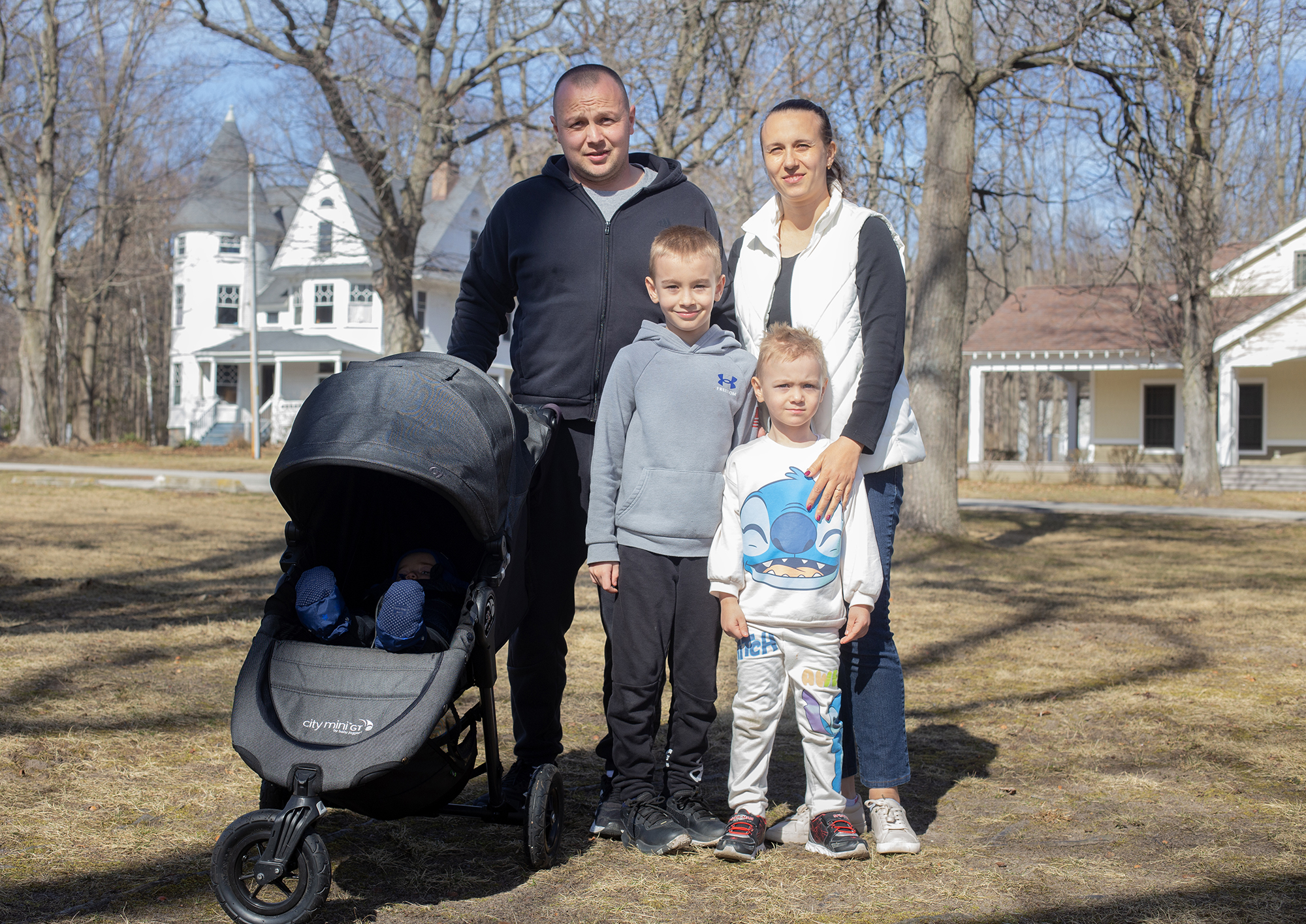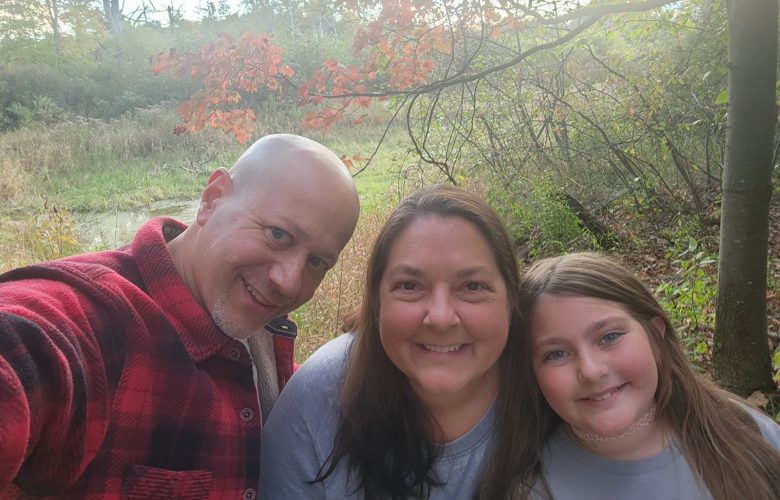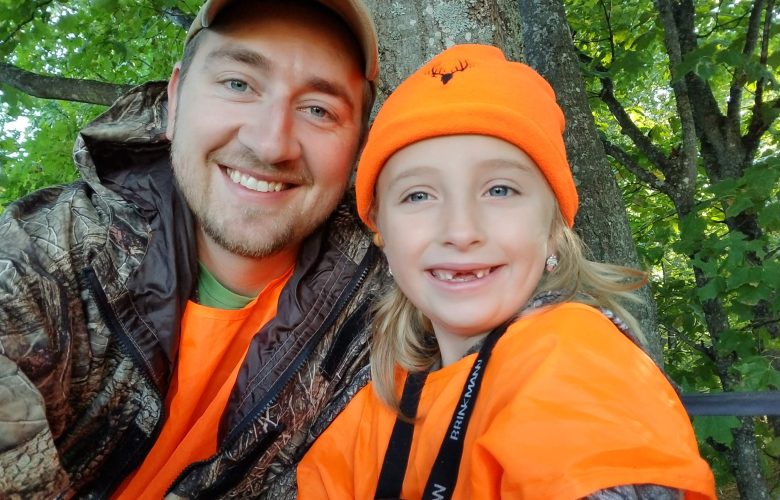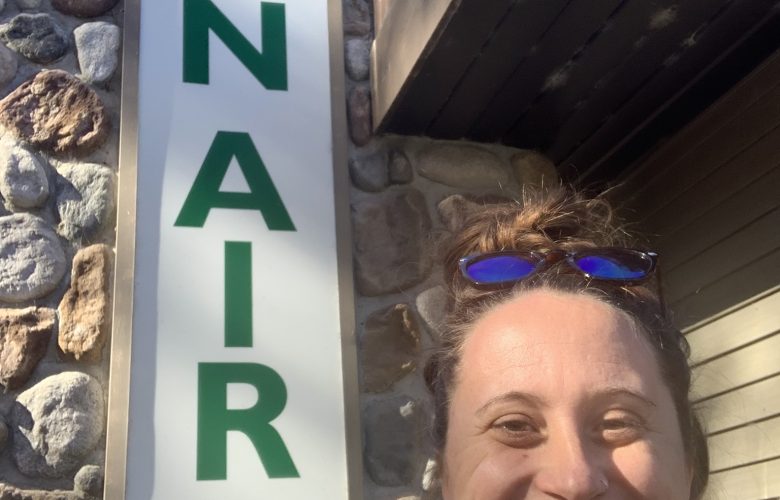Ukrainian family resettles in Frankfort
By Greta Bolger
Current Contributor
If you did not know that this family had left everything behind and traveled halfway around the world to seek safety from war-torn Ukraine, you might never guess. Their warm smiles and frequent laughter make it clear that they are focused on the future and not the devastating losses of their recent past. But as you begin to hear their stories (thanks, Google Translate) and see the photographs of their former home, it becomes heartbreakingly clear—and also very inspiring.
Ihor (34) and Yuliia (30) come from a small town called Kreminna, in the district of Kremensky, in the oblast of Luhansk—an “oblast” is similar to a state here in the United States. The couple met when they were teenagers, and married 10 years ago, looking ahead to a promising future.
Julie Schumaker was inspired to create the Benzie Welcome Corps (BWC) in early 2023, after watching the movie Peace by Chocolate, the true story of a Syrian refugee family welcomed by a town in Canada. After reading daily news about the ongoing war in Ukraine since its onset in February 2022, Schumaker thought, We could sponsor a family from Ukraine! What a safe haven Benzie County would be for a family fleeing war.
So in February 2023, Schumaker organized an initial meeting with a small group of community members to share her idea, and within two months, the “Benzie Welcome Corps” was well underway, with many individuals and organizations offering support.
By April 2023, an advisory board had been created to provide overall direction and oversight of the Benzie Welcome Corps; board members include Reverend John E. (Jack) Harnish, Joanne Manilla, Sandy Kanouse Morgan, Linda Tompkins Nunn, and Bruce Ogilvie.
Schumaker connected with Ihor and Yuliia’s family in September 2024, and they moved to Frankfort two months later, on November 15—the whole process took nine months, from start to finish.
Yuliia was a history teacher in secondary school, and Ihor—who had earned a Master’s degree in agricultural mechanization—managed the agricultural operations of his family’s 6,000-acre farm (equivalent to just under 10 square miles). Crops on the farm included sunflowers grown for sunflower oil export, as well as corn for export to China, plus wheat, barley, sorghum, and rye. The farm was also home to 700 head of dairy cows, managed by Yuliia’s father, who also oversaw cattle breeding and other livestock.
It was a good life. Ihor, an ambitious man who loves driving heavy equipment, was very much at home on the farm that he had worked since childhood. He and Yuliia were well prepared to care for their growing family and plan for a bright future.
Until the Russians invaded.
Escape and Devastation
February 24, 2022, was the beginning of the end for Ihor’s family farm. The Russian troops occupied their community and steadily began dismantling the farming business that his father had started in 1980.
The occupiers exported whatever they could of the remaining agricultural products and slaughtered the cattle to feed the Russian army. Constant bombing—up to 40 bombs a day—destroyed the rest of the farm.
“They erased our land and property from the face of the earth. The only place it still exists is on Google Maps,” Ihor says.
The family fled to Western Ukraine, where Yuliia and their two sons—Tymur (now 8) and Herman (now 4)—would be safer.
Though he is reluctant to talk about it, Ihor served in the Ukrainian army for 14 months. For a time, men with three or more children were exempt from serving, so with the birth of the couple’s new baby boy, Mark, in August 2023, Ihor was allowed to leave the service—but it was a tough decision.
After he was discharged, Ihor found that he could not be at peace living as a civilian in a country still undergoing the horrors of war and destruction.
It was at this time that Yuliia learned about Uniting for Ukraine (U4U) from a former college classmate, now living in Elkhart, Indiana. Ihor and Yuliia registered their family with U4U, a humanitarian parole program that was created by the Biden administration under the U.S. Department of Homeland Security. (Humanitarian parole has been offered by the United States at different times throughout history to various different countries.)
The Path to a New Home
The family connected with their private American sponsor group—led by Julie Schumaker (67) of Frankfort—via the Welcome Connect website.
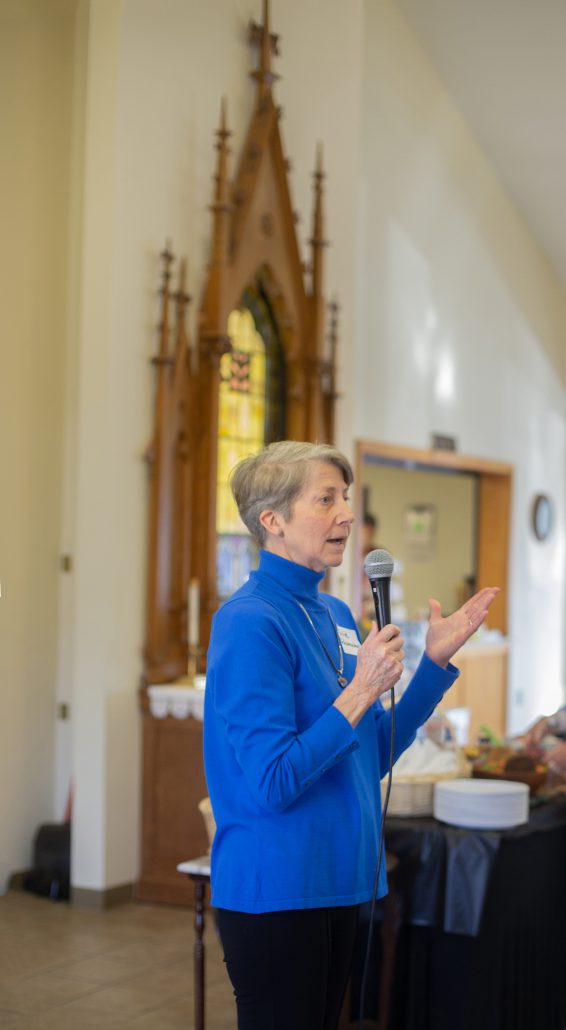
“Welcome Connect is kind of like online dating,” Schumaker says of the program. “You create profiles and interview candidates until you feel you have the right match. We had five families reach out within the first hour that our profile was online.”
Schumaker began the process of sponsoring a Ukrainian family in February 2023 when she created Benzie Welcome Corps (see sidebar). The group connected with Ihor and Yuliia’s family in September 2023, the Benzie Welcome Corps leadership team held a virtual meeting with the family on Zoom, and the family moved into their new home in Frankfort on November 15—nine months in total, from start to finish.
Notably, there are about 1 million people living in the United States who have Ukrainian ancestry, according to the U.S. Census, and Michigan has the ninth-highest population of Ukrainian-Americans with an estimated 36,000. (The largest is New York with 142,000.)
Moreover, Traverse City has the third-largest population of Ukrainian-Americans in our state—behind Grand Rapids and Detroit—and has two Ukrainian churches.
Since Russia’s invasion of Ukraine in February 2022, the Traverse City office of Immigration Law & Justice Michigan has served 145 new Ukrainian clients; this means nearly one-third of the office’s clients over the past two years have come from Ukraine alone, with the remainder coming from 42 different countries. Schumaker connected early with the law office, which has helped immensely to understand the family’s legal status.
U.S. law allows for other forms of international protection, such as: asylum when someone travels to the United States themselves; refugees who are screened in another country and resettled with the help of United Nations programs; special immigrant visas for Iraqi and Afghan translators who worked with the U.S. Armed Forces; and other programs like the Temporary Protection Status (TPS) for people from countries experiencing particular hardships, such as El Salvador, Haiti, Honduras, Nepal, Nicaragua, and Sudan or deferred enforced departure (DED) for Liberia and Hong Kong. (People with TPS or humanitarian parole do not necessarily have the right to apply for U.S. residency or citizenship, while refugees and asylees must apply for a green card after their first year and can apply for citizenship five years later.)
Unlike those mentioned above, though, the “humanitarian parole” program aimed at protecting Ukrainians is currently limited to two years—however, at the end of February, the Biden administration announced the possibility of a two-year extension.
Back in Ukraine
Though Ihor, Yuliia, and their three boys are now safely settled in Frankfort, the rest of their families are still living in Ukraine. Yuliia’s parents are in Lyman, a “sort-of” safe place, and are working to support the Ukrainian forces by delivering humanitarian aid, such as food, firewood, and other essentials. Ihor’s father enlisted and is on the front lines; currently, any man between the ages of 18 and 60 can be called up to serve. Meanwhile, Ihor’s mother is in Kyiv with his younger brother, who has cerebral palsy. Each of them also has a sister: Ihor’s sister, Tatania, and Yuliia’s sister, Anastasia, both remain in Ukraine. Fortunately, the family can still communicate via daily video calls, despite a seven-hour time difference.
When asked if they would ever go back, Ihor says:
“There is nothing to go back to. They took my children’s house, then their school, then the business I had worked in since childhood. We knew this was a one-way road. I need to build a future for my family.”
However, according to the family’s current “humanitarian parole” immigration status, they are not able to apply for a green card or permanent residence, so at most, they will get two to four years in the United States to rebuild, unless further extensions are granted.
For now, they are taking it one day at a time.
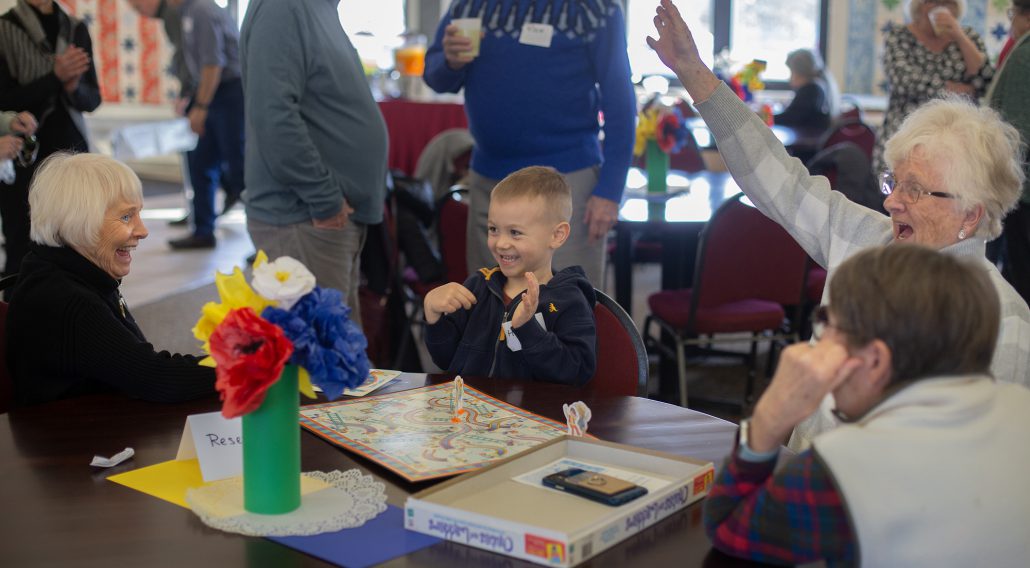
Future Plans and Needs
After he returned from the front, Ihor understandably underwent a major adjustment.
“Your values change,” he says. “I had to rewire my brain. The U.S. is a pill for my ailment. I feel at home here.”
As a small community in a four-season climate, Frankfort is quite similar to the family’s former home in Kreminna. Their professional experience will also be valuable, as they work to rebuild their lives.
Ihor had a Commercial Driver’s License (CDL) in Ukraine and is now attending a school in Cadillac that will provide him with the same credentials here. He looks forward to driving a big rig and hopes to find long-distance work initially, to establish himself in the field and generate a good income. With the shortage of qualified truck drivers, he is likely to find work quickly.
Meanwhile, Yuliia is already volunteering at baby Mark’s daycare and preschool, and she is looking to apply for a position as a teacher’s assistant in the Frankfort-Elberta Area Schools district, when her English skills are more developed.
The children are thriving in Frankfort schools.
“They go to school with joy every day,” Yuliia says. “But still no homework. In Ukraine, they have big homework!”
Tymur is in third grade and is becoming fluent in English, as he had three years of English instruction while still in Ukraine. Herman is in preschool, and baby Mark attends the early childcare’s infant/toddler room. Back in Ukraine, the older children had to change schools multiple times—both in-person and online—because of the war, and they are now very happy to be in a safe, steady environment.
“I will have friends!” Tymur says.
Housing is another piece of their future plans that still needs to fall into place. Their current home is a summer vacation rental that is already booked for the summer, beginning June 15, and thus they will need a place to move for at least the summer and preferably year-round. The family is also in need of a vehicle that can accommodate all five of them, including car seats.
In the meantime, they have most of what they need, thanks to the generosity of Benzie Welcome Corps and its many donors. (See sidebar for details.)
It is good to know that, even in difficult times, and in a sometimes cruel and dangerous world, our community can join together to help those in need. This young family is deeply grateful.
Ihor was emphatic about his family’s appreciation for all of the support they have received.
“We want to be useful to this community,” he says, “and show our gratitude to the people who did this for us. The people here are so friendly and kind. Other than the fact that they speak a different language, I feel like I am home.”
Ihor continues:
“I would also like to thank the people and the government of the United States for giving Ukrainians the right to exist and the right to defend our country.”
When Tymur asks his father if they will have to move again, Ihor responds:
“We are not going anywhere.”
Online donations and information about upcoming support opportunities can be found at GrowBenzie.org/BenzieWelcomeCorps online. Sign up to receive ongoing communications from Benzie Welcome Corps with news on how the family is doing and plans for ongoing support. In addition to needing a new home beginning June 15, 2024, the family will also need a second car, once both parents are working. If you have information about a possible housing solution and/or a vehicle that would comfortably fit a family of five—with multiple children’s car seats—and would consider donating it (or selling it for a reasonable price), contact Benzie Welcome Corps at BenzieWelcomeCorps@gmail.com via email.
Likewise, if you live in a community that might want to “sponsor” a Ukrainian family, reach out to Julie Schumaker via the same email above for more information. Learn more about sponsoring a family by visiting Welcome.US online. The United 4 Ukraine (U4U) program opened for registration on April 25, 2022, and it is managed by the U.S. Department of Homeland Security; as of December 2023, more than 170,000 Ukrainians have been granted parole through U4U for up to two years. However, the ratio of applicants to sponsors is around three-to-one, with many more sponsors needed.
Featured Photo Caption: Ihor (34), his wife Yuliia (30), and their sons, Tymur (8), Herman (4), and Mark (7 months) arrived from their native Ukraine on November 15, 2023. The family is sponsored by Benzie Welcome Corps and are now settled in Frankfort. They enjoy going to the nearby park as a family. Photo by Aubrey Ann Parker.
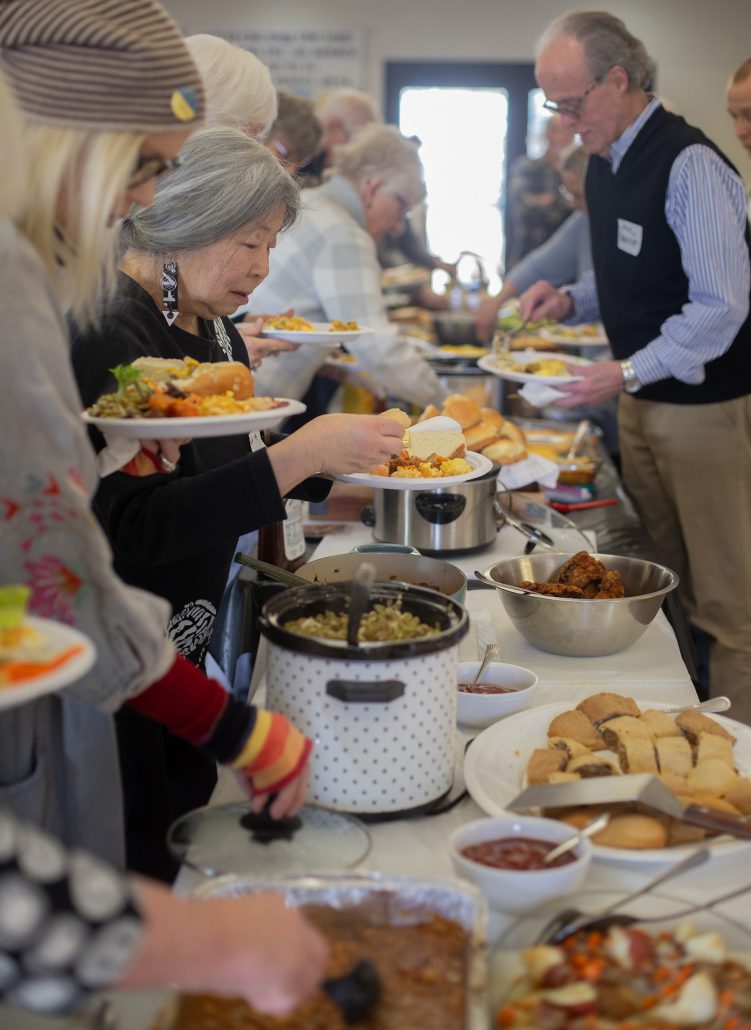
SIDEBAR
Community Offers Generous Donations
• Benzie’s “100 Women Who Care” provided $16,600 toward sponsoring a Ukrainian family. (There are now more than 170 women in this group; each woman pledges $100 quarterly and gets a vote on which nonprofit will receive that night’s proceeds.)
• Other donors include: St. Andrews Presbyterian Church ($6,390); Fr. Lovett Foundation of St. Philip’s Episcopal Church ($3,000); Benzie Sunrise Rotary Foundation ($1,500); Frankfort Willoughby Rotary Foundation ($1,000); First Congregational Church of Frankfort ($800); Ironman Foundation ($800); individual donors ($7,500 in cash donations and many donations of household and baby items, toys, and clothing); The Baby Pantry at St. Philip’s Episcopal Church (donations of a crib, baby items and clothing); Benzie Area Christian Neighbors (donations of food and clothing); and Toys for Tots (Christmas gifts for the children).
• Grow Benzie is the fiscal agent of Benzie Welcome Corps. As a 501(c)(3) nonprofit, all donations made to Grow Benzie for Benzie Welcome Corps are tax deductible. Check donations should be made out to Grow Benzie with “Benzie Welcome Corps” in the memo line.
• A local couple generously donated their 2003 Subaru Outback to the family. Until Ihor and Yuliia are both working, it provides the family with reliable transportation. (Once Ihor is working, the family will likely need two cars.)
• Many other community and regional resources also were also secured to help with applying for food and cash assistance, health benefits, and a social security card; connections with local immigration attorneys, medical providers, and interpreters; and connections with local resources including BACN, Frankfort-Elberta Area Schools, and Benzie Bus.

